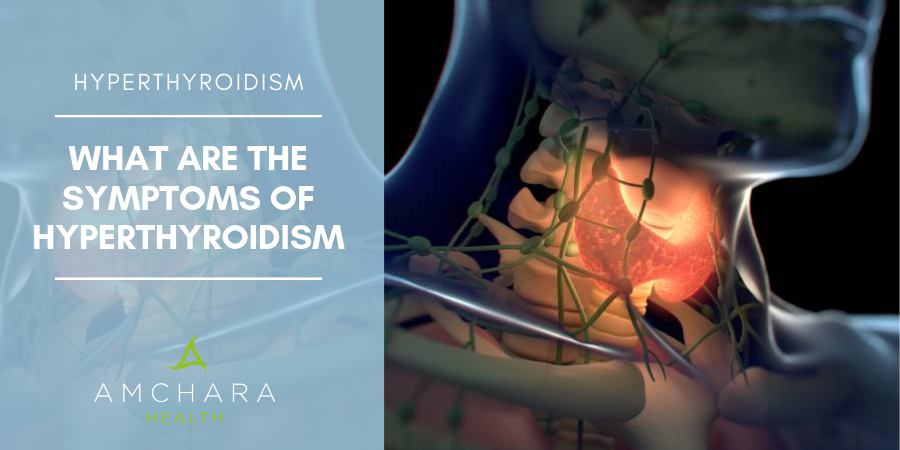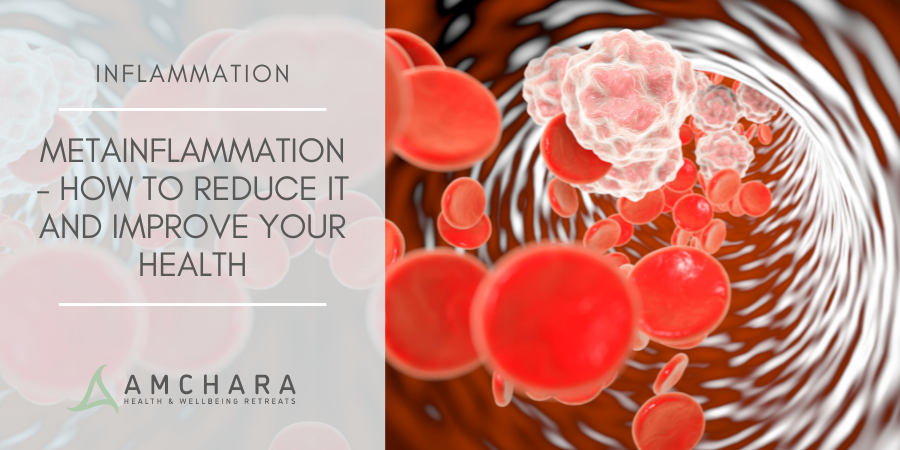In this article, we’ll look at a gland which controls the functioning of a wide range of body processes – the thyroid gland.
Although many of us will be familiar with the symptoms of an under-functioning thyroid, we’re going to discover what happens if this gland goes into overdrive.
Hyperthyroidism is the term used for an overactive thyroid – in other words when the gland produces too much thyroxine.
This hormone is primarily concerned with regulating the body’s metabolism, or how quickly we burn energy.
Excess thyroxine will speed up the metabolism.
This sounds like a good thing, as we’re all familiar with the effects of a sluggish metabolism, like fatigue, weight gain and feeling the cold.
A revved-up metabolism will undoubtedly lead to weight loss as energy is burnt off rapidly, but too much thyroxine is not such a good thing.
It can be tiring for the body and lead to a number of unpleasant side effects, which we’ll look at in a moment.
What is the Thyroid Gland?
Your thyroid sits at the base of your neck and is shaped a little like a butterfly.
The gland has a huge impact on your health because it influences every single cell in your body.
The thyroid acts as your body’s accelerator pedal.
Thyroid hormones control the rate your body uses carbohydrates and fats and metabolises protein.
These hormones also regulate your breathing, temperature, nervous system and heart rate.
When we talk about thyroid hormones we usually simply think of thyroxine, but strictly speaking, there are two hormones, called thyroxine or T4 and triiodothyronine or T3.
They are slightly different from each other – the variation being how much iodine is contained in each.
T4 needs to be converted to T3 before it can influence our body’s cells.
The release of thyroid hormones is caused by thyroid-stimulating hormone (TSH), which is produced by the pituitary gland in response to low levels of thyroxine circulating in the blood.
Excess production of thyroxine is known as thyrotoxicosis.
Normally, excess thyroxine would be detected by the pituitary gland which would then release less TSH.
However, in cases of hyperthyroidism, the thyroid carries on secreting thyroxine even when TSH levels are low.
The thyroid gland also produces a completely different hormone known as calcitonin which helps control the blood level of calcium.
Symptoms of an Overactive Thyroid
- Weight loss, even though appetite is not affected or is even increased.
- Palpitations; rapid or irregular heartbeat, often in excess of 100 beats a minute.
- A swelling at the base of the neck, caused by an enlarged thyroid gland. This is otherwise known as a goitre.
- Anxiety, nervousness, irritability, mood swings. Many people report feeling wired and unable to relax.
- Trembling of hands and fingers.
- Heat sensitivity, sweating.
- Menstrual problems such as irregular periods.
- Frequent bowel movements.
- Muscle weakness, fatigue and difficulty sleeping.
- Fine, brittle hair and thin skin.
- Eye problems such as dry, gritty eyes and double vision
If left untreated, hyperthyroidism can lead to a number of health issues such as heart problems, brittle bones and eye disorders.
Why the Thyroid Goes Wrong
The most common reason a thyroid gland produces too much thyroxine is due to an autoimmune condition called Grave’s disease.
An antibody called thyroid-stimulating immunoglobin is produced by the immune system which stimulates and inflames the thyroid.
This causes excessive thyroxine to be released.
According to the US National Institutes of Health (1), Grave’s disease is estimated to be 7-8 times more common in women than in men.
Thyroiditis, which is inflammation from a virus or simply as a consequence of chronic inflammation in the body can also stimulate the thyroid to produce too much thyroxine.
Sometimes an overactive thyroid may be caused by a benign tumour.
Finally, if excess iodine is consumed from food or supplements, this can encourage excess thyroid hormones to be produced.
Hyperthyroidism appears to have a genetic aspect.
It’s also more likely if you suffer from type 1 diabetes or adrenal fatigue.
Testing for an Overactive Thyroid
Because hyperthyroidism can cause such a wide range of symptoms, it can often be confused with other health problems.
Doctors will look at the relative levels of TSH, T4 and T3.
In hyperthyroidism, one or both of the thyroid hormones are high while TSH level is usually low.
A blood test can detect thyroid-stimulating immunoglobin in cases of Grave’s disease.
However, blood tests can often miss thyroid disorders.
One non-invasive test, called Thyroflex measures the speed at which a nerve impulse is conducted through nerve and muscle cells in the arm.
Because the health of the thyroid determines the speed of our reflexes, this test can be helpful at detecting both an under or an over-functioning thyroid.
Conventional Treatment for Hyperthyroidism
The medical profession uses drugs to reduce the production of thyroid hormones, such as methimazole, which acts by slowing down the process by which iodine is attached to thyroxine.
However, this drug is associated with some severe side effects such as liver inflammation and a dangerous drop in white blood cell production, causing poor immune system function.
It’s also connected with a number of less serious side effects such as skin rash, hair loss, gastrointestinal disturbances and tiredness.
Sometimes, radioactive iodine is used which is taken up by the thyroid gland and damages the cells which produce thyroxine.
However, up to 80% of people treated with radioactive iodine, according to The Society of Endocrinology (2), go on to develop an under-functioning thyroid.
In some cases, surgery is used to remove all or part of the gland.
No surgery is without its risks, and because it’s tricky to remove exactly the right amount of thyroid gland, most people will go on to develop hypothyroidism.
Once hypothyroidism occurs owing to drugs or surgery, medication with replacement thyroid hormones will then usually need to be taken for life.
Natural Support for an Overactive Thyroid
Although hyperthyroid is a complex condition and no single natural remedy will correct an over-functioning thyroid gland, there are a number of natural measures you can take to support both your thyroid gland and to help your body cope with a racing metabolism.
-
Iodine Restriction
Because iodine can stimulate excess thyroid hormone production, it’s often recommended to follow a low iodine diet if you have hyperthyroidism.
The following foods are rich in natural iodine:
- iodized salt. This provides over 200mcg iodine per teaspoon
- seafood, such as prawns
- seaweed such as kelp, dulse, nori and carrageenan, which is a seaweed extract used as a thickening agent
- dairy products
- egg yolks
- poultry or beef
- grain products (such as bread, pasta, and pastries), and cereals
It’s often said soy products such as soya beans, soya milk, soya sauce and tofu can suppress thyroid function, which would be helpful in cases of an over-functioning thyroid.
However, a recent review of studies (3) concluded soya had little effect on the thyroid gland.
-
Vitamin B12
Research has found hyperthyroidism can be connected with vitamin B-12 deficiency (4).
Symptoms of low B12 include fatigue, weakness and dizziness, heart palpitations, pale skin, nerve tingling and muscle weakness.
Some of these symptoms overlap with hyperthyroid symptoms.
B12 is one vitamin which is missing in the majority of plant-based foods.
Certain people lack the ability to make a substance called intrinsic factor which is essential for the absorption of this Vitamin.
B12 absorption also tends to decrease with age, and with digestive issues such as IBS or lowered production of stomach acid. In these cases, a supplement of B12 is advised.
-
Selenium
One study (5) gave patients 200mcg selenium per day in addition to anti-thyroid medication.
Researchers discovered the patients receiving the selenium ended up with lower thyroxine levels than those who did not.
Selenium naturally occurs in water and soil, but it’s low in many areas of agricultural land, including in the UK.
As a result, it’s commonly depleted in crops and the animals which feed on those plants, and deficiency is widespread (6).
Selenium is naturally found in nuts, especially brazil nuts, fish and seafood, turkey, eggs and beans.
-
Iron
Low levels of iron have been linked to elevated thyroid antibodies.
It makes sense to have your iron levels checked.
If they’re low, make sure to include plenty of iron-containing foods in your diets such as green leafy vegetables, beans, lentils, some red meat and poultry.
In some cases, you may benefit from taking an iron supplement.
-
Cruciferous Vegetables
Vegetables in this family, often also called brassica vegetables, such as broccoli, bok choy, brussels sprouts, cabbage, turnips, cauliflower and kale, when eaten raw, can actually impair thyroid function.
It’s thought substances in these vegetables can both impede the formation of thyroid hormones and compete with iodine for uptake by the thyroid gland (7).
For this reason, raw cruciferous vegetables often not recommended for people suffering from an underactive thyroid.
So it follows in the case of hyperthyroidism, they can be a useful addition to the diet.
-
Lifestyle Tips
If you’re losing weight from an overactive thyroid, nutrients will be used up faster by a hectic metabolism.
This means it’s important to concentrate on nutrient-dense foods.
Avoiding sugar, alcohol and gluten grains can help to support the immune system.
Weight-bearing exercise will be of benefit to lift mood but also to prevent loss of bone density and help strengthen muscles.
Start gradually with exercise as your heart rate may already be elevated.
Stress management techniques such as meditation, yoga and deep breathing exercises can be useful to manage the anxiety and nervousness which often accompany hyperthyroid.
Takeaway
Because hyperthyroid is so often connected with an autoimmune problem, a whole-body approach is the most effective for addressing this and any other problem caused by an immune system dysfunction.
A personalised consultation with an Amchara Naturopath can look at your nutrient levels, your gut bacteria, food sensitivities, detoxification processes and stress levels to help to uncover imbalances in your body systems which may be contributing to your symptoms.
Amchara also offers Thyroflex testing.
READ THIS NEXT:




